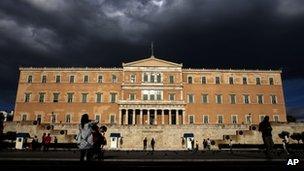Greece struggles to steer a path through the crisis
- Published

Storm clouds ahead: Greece now faces weeks of uncertainty
Greece is now heading along a path which President Karolos Papoulias, the socialist Pasok party and the conservative New Democracy party - and a significant proportion of the population - had all hoped to avoid.
After days of uncertainty following the inconclusive elections on 6 May, the country now faces weeks of instability as the different political parties campaign once again in what is likely to be a bitterly contested election.
The vitriolic atmosphere in which the final round of all-party talks for a technocrat government broke down on Tuesday does not bode well for the coming campaign.
Shortly after walking out of the talks, the main political leaders appeared on national television accusing each other of sabotaging the attempts to form a government.
The leader of New Democracy, Antonis Samaras, described the left-wing parties as "irresponsible and arrogant".
Then Alexis Tsipras, of the radical left-wing Syriza party, was on television accusing Mr Samaras and the leader of Pasok, Evangelos Venizelos, of trying to coerce his party into joining a coalition or holding an election "in a climate of blackmail and insecurity".
Opinion polls had suggested that a majority of the population wanted the politicians to compromise so a second election would be avoided.
<bold>Prolonged instability</bold>
And, on the streets of Athens on Tuesday, there was disappointment that the talks had collapsed.
Some believe the second election may also be inconclusive with no outright winner, leaving the country once again without a government.
Others fear the prolonged instability will further damage the markets.

Days of talks failed to resolve the political deadlock
But the attempt by Pasok and New Democracy to create a coalition government and so avoid another election was not motivated solely by a belief this would be better for the country and by a determination to ensure it remain in the eurozone.
Both parties have been on a downward slide and have little desire to face the electorate so soon after being humiliated in the 6 May vote.
In contrast, Syriza and other radical, anti-austerity parties have enjoyed a spectacular rise in popularity and could even take power after the second election.
Recent opinion polls have all shown Syriza ahead of both Pasok and New Democracy, but probably unable to form a government on its own.
There are, however, several anti-austerity parties it could approach to form a coalition.
Ditching the drachma?
So it is possible that next month Greece will have a government which is determined to completely rewrite the terms of the bailout agreement the country signed with the EU and IMF earlier this year.
And that, in turn, could lead to Greece leaving the eurozone.
But much could change between now and the next election.
The pressure on Greece from Brussels and eurozone countries is already intensifying with statements that the vote next month will, in effect, be a referendum on whether to remain part of the single currency.
The vast majority of Greeks do not want a return of the drachma.
And in the midst of this double crisis - both political and economic - Greece has to fulfil its commitments to implement further spending cuts as part of the bailout agreement.
This must be done next month, which is already set to be a key moment in the country's history.